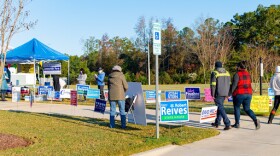North Carolina Gov. Roy Cooper has vetoed a sweeping Republican elections bill that would end a grace period for voting by mail and make new allowances for partisan poll observers. The Democratic governor North Carolina Gov. Roy Cooper announced Thursday that he would veto a sweeping Republican elections bill that would end a grace period for voting by mail and make new allowances for partisan poll observers.
In a video message, the Democratic governor accused legislative Republicans of using their slim veto-proof majorities to execute "an all-out assault on the right to vote," which he said has nothing to do with election security and everything to do with their party keeping and gaining power. The bill would make voting more difficult for young and nonwhite voters who are are more likely to vote absentee and less likely to elect Republicans, he said.
"They're making it harder for you to vote, hoping that you won't bother," he said, urging North Carolinians to contact their representatives and demand they uphold his veto.
The three-day grace period for counting mail-in ballots postmarked by Election Day has been in place since it got unanimous approval in 2009. Cooper, who is term-limited and cannot run for reelection in 2024, successfully blocked several components of the bill during past sessions. But Republicans now hold a narrow three-fifths supermajority needed to override his veto.
Sen. Warren Daniel, a Burke County Republican and chair of the Senate Redistricting and Elections Committee, said that by overriding Cooper's veto, Republicans will guarantee every citizen's right to vote with confidence in the state's election security.
"We are creating a secure election system that makes it easy to vote and protects election integrity," Warren said. "But Gov. Cooper wants his handpicked partisans running our elections and he apparently feels threatened by North Carolinians observing what happens in their polling places."
The governor's announcement comes as both major parties strengthen their forces in the Tar Heel state, which is expected to be a presidential battleground and home to one of the nation's most competitive gubernatorial races. Most of the proposed election changes would take effect in early 2024, before the state holds elections for president, governor, Congress, the General Assembly and other state and local offices.
North Carolina's 7.3 million registered voters already must navigate new voter identification requirements, starting with local elections this fall, after the Republican-controlled state Supreme Court upheld a 2018 law in April.
The new bill, passed last week along party lines, would remove a state law that allows elections officials to count absentee ballots received by mail for up to three days after the election if they are postmarked by Election Day. A previously vetoed proposal contained in the bill would instead require those ballots to be returned to county elections offices by the time in-person voting ends at 7:30 p.m. on the day of the election.
Across the country, Republican-controlled legislatures have acted against early voting — shortening windows for returning mail ballots, banning or limiting the use of drop boxes and criminalizing third-party ballot collection.
Other previously vetoed provisions would prohibit officials from accepting private money to administer elections and direct state courts to inform elections officials about potential jurors being disqualified because they aren't U.S. citizens, so they can then be removed from voter rolls.
New guidelines for partisan poll observers would allow them to move freely about the voting location instead of being confined to a certain area.
Republicans say the changes are needed to improve efficiency and restore trust in the state's electoral process. But Democrats argue that the changes would make it more difficult for minority groups to cast ballots and could increase intimidation at the polls.
Attorney General Josh Stein, the only prominent Democrat running for governor in 2024, criticized Republicans for creating what he called "barriers to the ballot box" and said state leaders should be doing everything in their power to make it easier, not harder, for eligible voters to be heard.
The offices of Senate leader Phil Berger and House Speaker Tim Moore did not respond to emails seeking comment Thursday on the veto announcement.
Cooper also vowed Thursday to veto another elections bill once it reaches his desk. That proposal, which has idled in the House since the Senate approved it in June, would shift appointment power for the State Board of Elections from the governor to legislative leaders.
___
Hannah Schoenbaum is a corps member for the Associated Press/Report for America Statehouse News Initiative. Report for America is a nonprofit national service program that places journalists in local newsrooms to report on undercovered issues.
WUNC's Rusty Jacobs contributed to this report.






